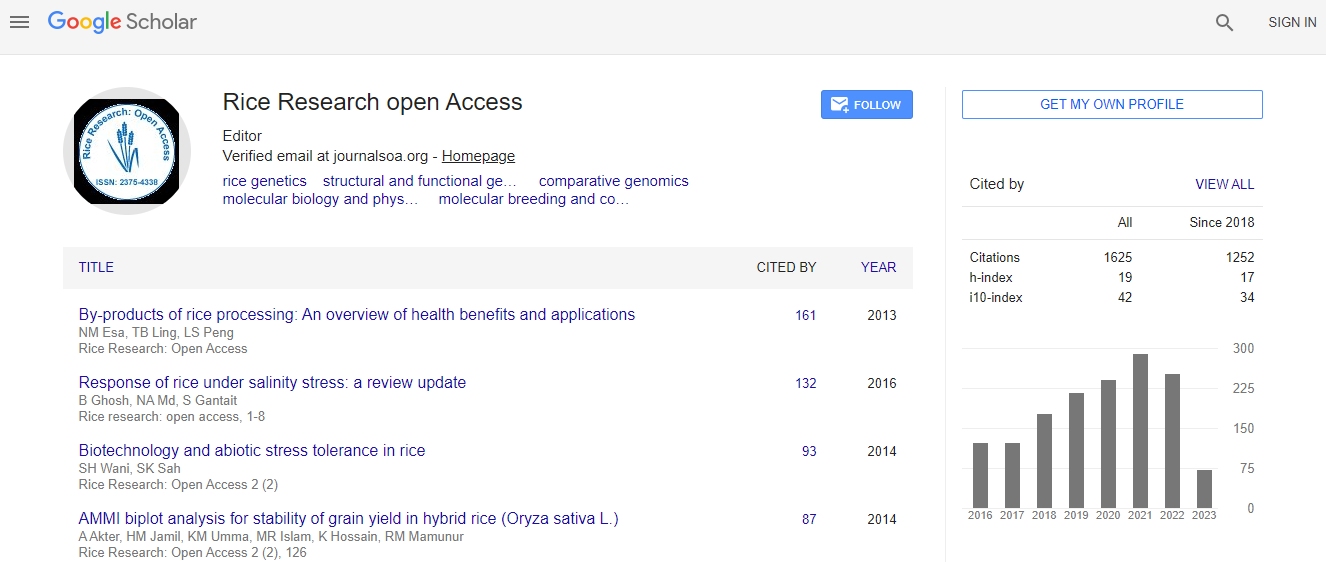Review Article
System of Rice Intensification for Increased Productivity and Ecological Security: A Report
| K.N. Bhatt* | |
| National Consultation on SRI, G. B. Pant Social Science Institute, Jhusi, Allahabad, India | |
| Corresponding Author : | K.N. Bhatt Associate Professor and Coordinator University of Allahabad, Allahabad, U.P, India Tel: +919454951081 E-mail: knbhatt1@rediffmail.coms |
| Received August 11, 2015; Accepted September 20, 2015; Published September 25, 2015 | |
| Citation: Bhatt K.N (2015) System of Rice Intensification for Increased Productivity and Ecological Security: A Report 3:147. doi:10.4172/2375-4338.1000147 | |
| Copyright: © 2015 Bhatt K.N, This is an open-access article distributed under the terms of the Creative Commons Attribution License, which permits unrestricted use, distribution, and reproduction in any medium, provided the original author and source are credited. | |
| Related article at Pubmed, Scholar Google | |
Abstract
The present technology of paddy production leaves behind ecological foot prints caused by overuse of fossil fuels and synthetic fertilizers that pollute almost a quarter to one third of world’s annual fresh water supply. Overuse of water contributes to emission of greenhouse gases causing more global warming. Besides, input costs are high and the additional inputs, particularly synthetic fertilizers to increase production are leading to diminishing or constant returns over the years. The method is ill suited for rain-fed areas. Despite this, India has relied on such input management practices attempting to improve yield for its food security. Such highly intensive agriculture dependent on fossil fuels, damaging to soil and fresh water, and crop diversity is becoming questionable today. The real challenge therefore is to develop/adopt strategies based on sound ecological principles and integrate traditional organic farming practices and biodiversity with scientific knowledge. System of Rice Intensification (SRI) is a promising resource conserving method of growing rice both under irrigated and rain fed conditions as the method is based on alternate wetting and drying interval. Application of controlled irrigation reduces nitrogen export to the environment in comparison with flooding irrigation management and reverses climate change. Around 40 countries of the world today are reaping the benefits of SRI. Rice is grown on 42.5 m ha in India, which is the largest area among rice growing counties and provides 29% of the calorie requirement in India with a production of 85.59 million tons and average yield of 2.2 t per ha. Area under rice is expected to be reduced to about 40 million ha in the country in the next 15 to 20 years due to water shortage and rapid industrialization and urbanization. The Problems confronted in rice production particularly by resource deficient small and marginal farmers and rain-fed areas are well known. G. B. Pant Social Science Institute, University of Allahabad, Allahabad organized a two-day National Consultation session on the subject on 6th and 7th, April, 2015. The Consultation explored the alternatives ways of resource efficient SRI method for paddy cultivation in comparison to the existing resource intensive post Green Revolution conventional method. It focused on examination of the SRI method, considering particularly the contributions of soil organic matter, indigenous rice varieties, responses and roles of soil microbes, resourceuse efficiency, and labor use efficiency and productivity. It considered SRI and its relationships to biodiversity and ecological security, linking agricultural practices to the larger natural environment in which we live and produce. The Consultation also envisioned on a more desirable future, looking at SRI expansion across the country, at the roles and empowerment of farmers, and at the institutions, policies and knowledge-deepening that will make this all possible.

 Spanish
Spanish  Chinese
Chinese  Russian
Russian  German
German  French
French  Japanese
Japanese  Portuguese
Portuguese  Hindi
Hindi 
